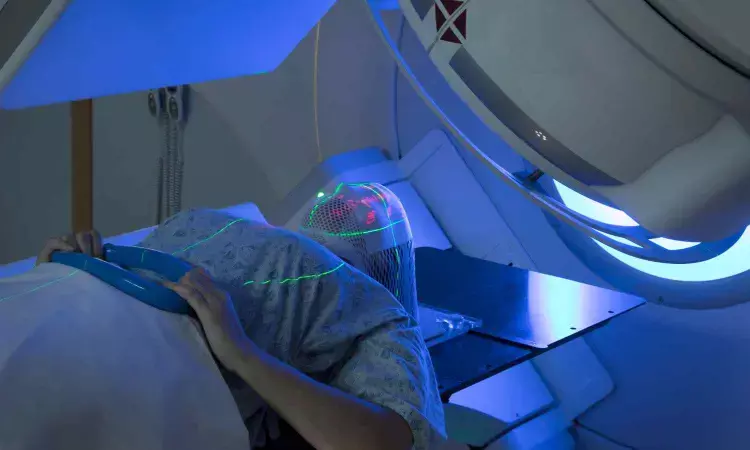- Home
- Medical news & Guidelines
- Anesthesiology
- Cardiology and CTVS
- Critical Care
- Dentistry
- Dermatology
- Diabetes and Endocrinology
- ENT
- Gastroenterology
- Medicine
- Nephrology
- Neurology
- Obstretics-Gynaecology
- Oncology
- Ophthalmology
- Orthopaedics
- Pediatrics-Neonatology
- Psychiatry
- Pulmonology
- Radiology
- Surgery
- Urology
- Laboratory Medicine
- Diet
- Nursing
- Paramedical
- Physiotherapy
- Health news
- Fact Check
- Bone Health Fact Check
- Brain Health Fact Check
- Cancer Related Fact Check
- Child Care Fact Check
- Dental and oral health fact check
- Diabetes and metabolic health fact check
- Diet and Nutrition Fact Check
- Eye and ENT Care Fact Check
- Fitness fact check
- Gut health fact check
- Heart health fact check
- Kidney health fact check
- Medical education fact check
- Men's health fact check
- Respiratory fact check
- Skin and hair care fact check
- Vaccine and Immunization fact check
- Women's health fact check
- AYUSH
- State News
- Andaman and Nicobar Islands
- Andhra Pradesh
- Arunachal Pradesh
- Assam
- Bihar
- Chandigarh
- Chattisgarh
- Dadra and Nagar Haveli
- Daman and Diu
- Delhi
- Goa
- Gujarat
- Haryana
- Himachal Pradesh
- Jammu & Kashmir
- Jharkhand
- Karnataka
- Kerala
- Ladakh
- Lakshadweep
- Madhya Pradesh
- Maharashtra
- Manipur
- Meghalaya
- Mizoram
- Nagaland
- Odisha
- Puducherry
- Punjab
- Rajasthan
- Sikkim
- Tamil Nadu
- Telangana
- Tripura
- Uttar Pradesh
- Uttrakhand
- West Bengal
- Medical Education
- Industry
ASCO: Proton therapy demonstrates advantages in Phase III head and neck cancer trial

According to preliminary data from a multi-institution Phase III trial led by researchers at The University of Texas MD Anderson Cancer Center, intensity modulated proton therapy (IMPT) achieved similar clinical outcomes and offered significant patient benefits when compared to traditional intensity modulated radiation therapy (IMRT) as part of chemoradiation treatment for patients with oropharyngeal (head and neck) cancer.
The results were presented today at the 2024 American Society of Clinical Oncology (ASCO) Annual Meeting by Steven Frank, M.D., professor of Radiation Oncology and executive director of the Particle Therapy Institute at The University of Texas MD Anderson Cancer Center.
With a median follow-up of three years, the progression-free survival (PFS) rate was 83% and 83.5% for IMPT and IMRT, respectively, and IMPT was statistically non-inferior to IMRT. There was a significant reduction of malnutrition with IMPT, with 24% of patients sustaining their nutrition with less than 5% weight loss during treatment compared with 14% of those receiving IMRT. Additionally, there was a significant reduction of feeding-tube dependence with IMPT at 28%, compared to 42% with IMRT.
“The results of this multi-center Phase III randomized trial provide evidence for IMPT as a new standard-of-care treatment approach for the management of head and neck tumors,” Frank said. “This is significant for patients as it represents a curative, de-intensified option compared to traditional radiation therapy.”
Proton therapy has both biological and physical advantages over traditional radiation therapy using photons. Unlike photons, protons have mass and can be stopped by the human body. This allows proton radiation to be delivered specifically to the targeted area, limiting the amount that reaches nearby normal tissues. This trial represents the largest randomized Phase III trial to date to investigate proton therapy in comparison to traditional radiation.
The trial enrolled 440 patients at 21 sites in the U.S., with 219 receiving IMRT and 221 receiving IMPT. Patients were stratified based on human papillomavirus (HPV) status, smoking status and whether they had received induction chemotherapy. The primary endpoint of the study was the PFS rate at three years.
“Historically, these kind of large-scale trials to confirm the benefits of proton therapy have been challenging, due in part to relatively few patients having access to proton therapy centers,” Frank said.” Encouraging results like these demonstrate the benefits of proton therapy and hopefully help pave the way for increased access for patients in need.”
Reference:
ASCO: Proton therapy demonstrates advantages in Phase III head and neck cancer trial, University of Texas M. D. Anderson Cancer Center, Meeting: American Society of Clinical Oncology Annual Meeting 2024.
Dr Kamal Kant Kohli-MBBS, DTCD- a chest specialist with more than 30 years of practice and a flair for writing clinical articles, Dr Kamal Kant Kohli joined Medical Dialogues as a Chief Editor of Medical News. Besides writing articles, as an editor, he proofreads and verifies all the medical content published on Medical Dialogues including those coming from journals, studies,medical conferences,guidelines etc. Email: drkohli@medicaldialogues.in. Contact no. 011-43720751


